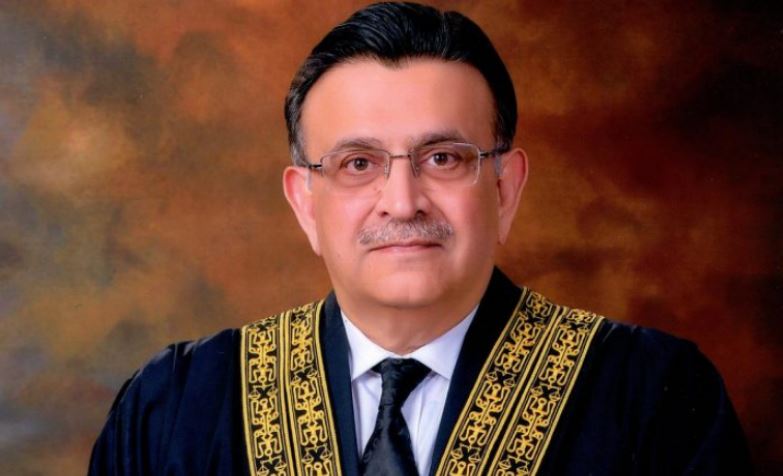Islamabad: A larger bench of five judges of the apex court resumed hearing on Tuesday into the Suo-Motu notice by Chief Justice of Pakistan Justice Umar Ata Bandial of the current political and constitutional crises raised following the ruling out decision of the no-trust motion by Deputy Speaker of National Assembly Qasim Suri and the subsequent dissolution of the national assembly by President of Pakistan on the advice of Prime Minister Imran Khan.
Following Sunday’s developments, CJP had taken Suo-Motu notice of the situation and formed a five-member bench headed by CJP Umar Ata Bandial and comprising Justice Ijazul Ahsan, Justice Mazhar Alam Miankhel, Justice Munib Akhtar and Justice Jamal Khan Mandokhel.
At the outset of today’s hearing, PPP Senator Raza Rabbani presented his arguments.
Referring to the actions of the deputy speaker, Raza Rabbani said that Qasim Suri’s decision was based on ‘dishonesty.’
“Whatever has happened can only be termed as civilian martial law,” Raza Rabbani said.
During the hearing, CJP Bandial said that they will issue a short order of the day after all the parties complete their arguments.
Monday’s session
On Monday, various parties presented their arguments including Farooq H. Naek and Babar Awan.
At the beginning of his arguments, the counsel of PPP Farooq H. Naek had requested the apex court to establish a full court for hearing the Suo-Motu notice, which was categorically rejected by the CJP.
Responding to the request, CJP had said, “If there is a lack of confidence in any of the judges, the bench will rise.”
The CJP had also wondered why opposition members failed to attend the meeting of the parliamentary committee on national security, during which contents of the ‘threat letter’ were shared with parliamentarians.
During the hearing, Justice Akhtar had questioned the deputy speaker’s constitutional authority to pass such a ruling.
“I don’t think the deputy speaker had the authority to pass such a ruling,” he had said, adding that only the speaker could do so.
The session was adjourned till Tuesday (today) with the CJP saying that the court has to hear other respondents as well before giving a reasonable decision.
Sunday’s Suo-Motu hearing
After a brief hearing on Sunday, a written order was issued which said the court would like to “examine whether such an action (dismissal of the no-trust motion based on Article 5) is protected by the ouster (removal from the court’s jurisdiction) contained in Article 69 of the Constitution.”
Later, the SC restrained state institutions from taking any extra-constitutional steps and directed them to act strictly as per the Constitution, besides asking all political forces of the country to remain peaceful.
Further, Attorney General Khalid Jawed Khan said that whatever decision was given by the Supreme Court of Pakistan concerning a ruling by Deputy Speaker Qasim Khan Suri against the no-trust move would be implemented.
Dismissal of No-trust motion
The series of events began escalating after Deputy Speaker of National Assembly Qasim Suri rejected the no-trust motion submitted by the joint opposition, citing it to be “unconstitutional” and contrary to Article 5 of the Consitution of Pakistan.
After the short session of the national assembly which was convened to vote on the no-trust motion and witnessed its rejection instead, Prime Minister Imran Khan held a televised address to the nation.
During the address, Prime Minister Imran Khan announced that he had advised President Dr Arif Alvi to dissolve the national assemblies and call early elections.
Prime Minister also congratulated the nation for the no-trust motion being dismissed, saying the deputy speaker had “rejected the attempt of changing the regime [and] the foreign conspiracy”.
Dissolution of NA
Within minutes after PM’s address, the President of Pakistan Dr Arif Alvi approved the dissolution of the National Assembly.
The news was confirmed in a press release issued by President’s Secretariat.
“President Dr Arif Alvi approved the Prime Minister’s advice to dissolve the National Assembly. The President gave his approval under Articles (1) 58 and (1) 48 of the Constitution,” the press release said.
Later in the evening, the Cabinet Division issued a notification, declaring that Imran Khan ceased to hold the prime minister’s office with immediate effect. “Consequent upon dissolution of the National Assembly by the president of Pakistan, in terms of Article 58(1) read with Article 48(1) of the Constitution of the Islamic Republic of Pakistan… Mr Imran Ahmad Khan Niazi ceases to hold the office of the prime minister of Pakistan, with immediate effect,” it read.
However, later, the president issued a notification allowing him to continue as the prime minister:
“Imran Ahmad Khan Niazi shall continue as Prime Minister till the appointment of caretaker Prime Minister under Article 224 A (4) of the Constitution of the Islamic Republic of Pakistan.”










